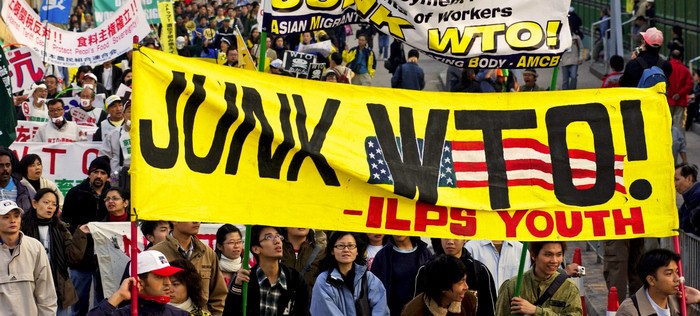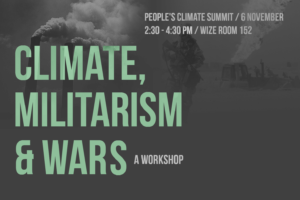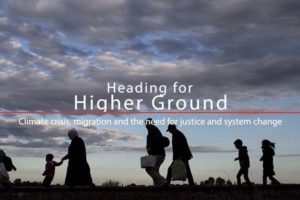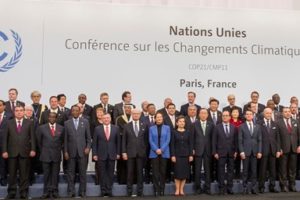[[{“type”:”media”,”view_mode”:”media_large”,”fid”:”1209″,”attributes”:{“alt”:””,”class”:”media-image”,”height”:”217″,”typeof”:”foaf:Image”,”width”:”480″}}]]
It has been two decades since the establishment of the World Trade Organization (WTO), a successor to the General Agreement on Tariffs and Trade (GATT), which created a multilateral trading system encompassing trade in goods, services, agriculture, and intellectual property.
While a trade organization like the WTO supposedly provides members access to each other’s markets on equal terms, developed countries’ interests have dominated the GATT and the WTO from the start. The WTO’s trade policy framework has thus led to more inequality and long-term problems for developing states.
Through the relaxation of restriction on foreign investments under the WTO’s trade liberalization scheme, developed countries and their big companies continue to exploit land, workers and other resources from developing countries for their own gain. This has intensified inequality between and within countries. In 2014, the UN Development Programme reported that 85 of the richest people in the world have wealth equivalent to the wealth of 3.5 billion of the poorest people in the world. In 2010, 25 major American corporations surpassed the 2010 gross domestic product (GDP) of entire countries. An example is Wal-Mart whose 2010 revenue amounted to $421.89 billion,which is larger than Norway’s GDP ($414.46 billion) and 157 smaller countries.This clearly shows that half of the world’s wealth is owned by the richest one percent.
The dismantling of trade barriers that cover basic services in health care, education, environment, sanitation, water and other social services allowed transnational corporations (TNCs) of rich countries to acquire companies and privatize public services within developing nations. Unbridled competition has also resulted to lowering of labor standards and easing of environmental regulations to attract investments, leading to more human rights violations in the workplace, massive land grabbing and environmental degradation.
Since colonization, neoliberal policies intensified the sufferings of indigenous peoples. This shall worsen as the WTO imposes more agreements and policies that shall further encroach, destroy and plunder indigenous lands and territories through unsustainable projects such as mono-cultural chemically intensive plantations, extractive industries like mining and oil drilling, and dams and other environmentally destructive “renewable” energy projects. Those who resist suffer from militarization and State terrorism, including extrajudicial killings, enforced disappearance, assassination, arbitrary arrests, imprisonment, criminalization of community resistance, harassment and vilification as “terrorists.”
The WTO’s enforcement of intellectual property rights (IPR) hindered developing countries’ access to medicines and medical technology because of the high cost of paying for patent licenses. In the Sub-Saharan African region, an estimated 24.7 million HIV patients cannot access patented anti-retroviral medicines because of prohibitive costs.The WTO also allowed American transnational agribusiness corporation Monsanto to draft a policy under its IPR agreement to place patents on all life forms, from microorganisms to plants. This provided Monsanto an advantage over developing country members of the WTO to control their seeds. TNCs are also attacking indigenous knowledge by patenting plant varieties discovered and cultivated by indigenous peoples for food, medicine and rituals.
In the agriculture sector, the failure of the WTO to reduce the subsidies of developed countries to their farmers has affected the livelihood of cotton farmers in Africa because of the overproduction of cotton in the world market. The cheap price of cotton exported by African farmers led to a decline in production by almost 50% in 12 main African cotton producers between 2005 and 2009.
The expansion of poultry imports from developed countries led to massive rural job loss in Africa. From 1994 to 2003, 110, 000 rural jobs were lost each year in Cameroon. In Ivory Coast, an estimated 1,500 poultry producers ceased production between 2001 and 2003, leaving 15,000 people jobless. In Senegal, 70% of the poultry industry was wiped out because of the poultry expansion of the European Union (EU).
The removal of trade barriers also paved the way for massive importation of food and agricultural products that destroyed the Philippine’s path to self-sufficiency and food security. According to the peasant movement Kilusang Magbubukid ng Pilipinas, an estimated 2.85 million metric tons of rice was imported by the Philippine government in 2014, leaving a huge drop in farmgate prices of locally produced rice.
The WTO’s policies continue to support corporate control in food systems and trade by altering food safety and price regulations, intellectual property protection and agriculture subsidies. It has also trapped developing countries into exporting cheap raw materials and allowing imported food and agricultural products to their local markets leaving domestic production to decline. Almost 800 million people worldwide continue to suffer from hunger because of corporate control on food.
As if 20 years of the WTO’s stranglehold is not bad enough, the US, EU, Japan and other developed countries want the upcoming 10th Ministerial Conference (MC10) this 15-18 December 2015 in Nairobi, Kenya to commence negotiations on “new issues” – which are really old proposals that these countries have long been seeking to impose as new rules on trade and investments binding on all countries. These would further strengthen the ability of TNCs to operate within and across borders and dictate the prices of goods and services making them unaffordable to the common people. They would also rob developing countries of their remaining policy tools that are necessary for promoting sustainable development and realizing people’s rights.
Over the years, people’s organizations have seen the WTO as an instrument that exploits developing nations. Twenty years of its existence has already forced radical changes in the laws of sovereign states and threatened the lives and livelihood of peoples around the world. Any expansion of its power will lead to more losses of our democratic rights. We urge the public to be vigilant and not be misled by rhetoric on the benefits of neoliberal trade and the WTO.
We call on the public to support people’s organizations and pro-poor advocates pushing fora pro-people trade system that promotes environmental sustainability, genuine economic cooperation, and the right to development. We urge each nation to adopt economic policies and programs that assert their sovereignty over their agriculture and food systems. National and international trade systems should promote policies that will be able to dismantle international cartels and capitalist monopolies that manipulate the prices of commodities in the international market.
As long as the WTO runs world trade, corporate elites and their governments will continue to abuse the people and resources of developing countries. We should not allow this to persist.
20 years of corporate plunder is enough! 20 years of manipulation is enough! 20 years of inequality is enough! 20 years of the WTO is enough!
Now is the time for genuine system change and fair economic cooperation that promotes development for all! Join the fight against WTO! Junk the WTO!
If you endorse this statement, please send your organization’s name and country to Mark Pascual <mpascual@iboninternational.org>
Initiators:
- AlliansiGerakanReformaAgraria (AGRA) – Indonesia
- All Nepal Peasant’s Federation (ANPFa) -Nepal
- AMGL (AlyansangMagbubukidsaGitnangLuson) – Philippines
- AMIHAN (National Federation of Peasant Women) – Philippines
- Andhra Pradesh VyavasayVruthidarula Union (APVVU) – India
- ADLO-KMU, Philippines
- Anakbayan-USA
- ANGLO-KMU, Philippines
- APIT-TAKO – Philippines
- APWSL, Korea
- Association for the Rights of Children in South East Asia (ARCSEA)
- Auckland-PhilippinesSolidarity– New Zealand
- Asian Peasant Coalition (APC)
- Asia Monitor Research Center (ACRM)
- Asia-Pacific Research Network (APRN)
- Association for Research and Cooperation in Support of Endogenous Development (ARCADE), Senegal
- BAYAN- Central Visayas
- BAYAN-USA
- BIGUF, Bangladesh
- Campaign for Peace & Democracy (Manipur)
- Centre for Phil. Concerns Montreal (CPC) – Canada
- Centre for Research and Advocacy-Manipur (CRAM) – India
- Children’s Rehabilitation Center – Philippines
- Communication Workers Union, Australia
- ConfédérationNationale des Travailleurs du Sénégal (CNTS), Sénégal, West Africa
- COURAGE, Philippines
- Defend Jobs Philippines
- EILER, Philippines
- Femmes de diverses origins, Canada
- FASV, Guatemala
- FGIE, Ecuador
- FPR, Mexico
- Global People Surge (GPS)
- HUSTISYA, Philippines
- IBON International
- Indian Federation of Toiling Peasants (IFTOP) – India
- Indigenous Peoples Movement for Self-Determination and Liberation (IPMSDL)
- International Association of People’s Lawyers
- Gabriela-USA
- GATWU, India
- KADAMAY-National Capital Region, Philippines
- KALIKASAN (Peoples Network for the Environment) – Philippines
- KASAMA-TK (KatipunanngSamahangMagbubukidngTimogKatagalugan) – Philippines
- KMK, Philippines
- KilusangMagbubukidng Pilipinas (KMP) – Philippines
- Kilusang Mayo Uno, Philippines
- KMP-NMR – Philippines
- Migrante Australia
- Migrante Canada
- NAFCON-USA
- NAFLU-KMU, Philippines
- National Federation of Sugar Workers (NFSW) – Philippines
- National Network of Agrarian Reform Advocates (NNARA-Youth) – Philippines
- NTUI, India
- NYCHRP, USA
- PAMALAKAYA (Pambansang Lakas ng Kilusang Mamamalakayang Pilipinas) – Philippines
- PAMANGGAS – Philippines
- Parents Alternative on Early Childhood Care and Development (PAI) – Philippines
- Peoples Coalition on Food Sovereignty (PCFS)
- Pesticide Action Network Asia Pacific (PAN AP) – Malaysia
- Pesticide Action Network (PAN)-Philippines
- Philippines Australia Union Link, Australia
- Philippines- Australia Solidarity Association – Australia
- Philippine Network of Food Security Programmes (PNFSP)-Philippines
- PILAR, Hong Kong
- PISTON, Philippines
- Reality of Aid – Asia Pacific
- Red Guards Los Angeles, USA
- Red Sparks Union, Canada
- Roots for Equity – Pakistan
- SAGUPA-SB – Philippines
- Salinlahi Alliance for Children’s Concerns – Philippines
- Serve the People Association –Taiwan
- Seruni, Indonesia
- Sinagbayan – Philippines
- Stop Exploitation – Philippines
- Sugar Workers Solidarity Network (SWSN) – Philippines
- Society for Rural Education (SRED) – India
- Tamil Nadu Women’s Forum (TNWF) – India
- Tenaganita (Women’s Force) – Malaysia
- UISTAACT-FSM – France
- UnyonngManggagawasaAgrikultura (UMA) – Philippines
- UPRA, Venezuela



